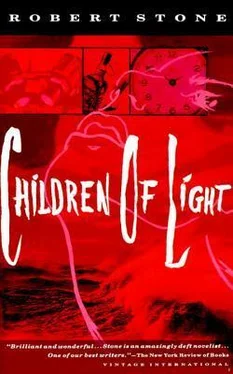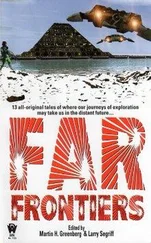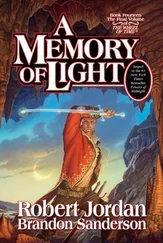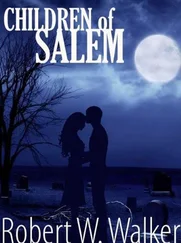Robert Stone - Children of Light
Здесь есть возможность читать онлайн «Robert Stone - Children of Light» весь текст электронной книги совершенно бесплатно (целиком полную версию без сокращений). В некоторых случаях можно слушать аудио, скачать через торрент в формате fb2 и присутствует краткое содержание. Год выпуска: 1992, Издательство: Vintage, Жанр: Современная проза, на английском языке. Описание произведения, (предисловие) а так же отзывы посетителей доступны на портале библиотеки ЛибКат.
- Название:Children of Light
- Автор:
- Издательство:Vintage
- Жанр:
- Год:1992
- ISBN:нет данных
- Рейтинг книги:4 / 5. Голосов: 1
-
Избранное:Добавить в избранное
- Отзывы:
-
Ваша оценка:
- 80
- 1
- 2
- 3
- 4
- 5
Children of Light: краткое содержание, описание и аннотация
Предлагаем к чтению аннотацию, описание, краткое содержание или предисловие (зависит от того, что написал сам автор книги «Children of Light»). Если вы не нашли необходимую информацию о книге — напишите в комментариях, мы постараемся отыскать её.
Children of Light — читать онлайн бесплатно полную книгу (весь текст) целиком
Ниже представлен текст книги, разбитый по страницам. Система сохранения места последней прочитанной страницы, позволяет с удобством читать онлайн бесплатно книгу «Children of Light», без необходимости каждый раз заново искать на чём Вы остановились. Поставьте закладку, и сможете в любой момент перейти на страницу, на которой закончили чтение.
Интервал:
Закладка:
“Mr. Lowndes,” Charlie said, with the air of a man opening first one expensive cigar and then another, “let me introduce Gordon Walker, who adapted The Awakening for the screen. You know Mr. Axelrod, I think.”
Lowndes when he leaned forward turned out to be a bulky man with a pitted face and aviator spectacles. The hand he offered Walker was big and thick-fingered like a countryman’s.
“How’re you?” Lowndes said. Walker saw that he was drunk and so was Best.
“This is Dongan Lowndes, Gordon,” Freitag said. “Our guest from New York.” He clapped Walker on the shoulder. “Listen,” he said, “we finished the late work today, so tomorrow we can drink and be merry. People are coming for a cookout at eight o’clock. Carne asada under the stars. We’ll talk.”
“Great,” Walker said.
“Claire would have loved to make it, but — you know, she’s busy with groups. She sends her best.”
“And mine to her,” Walker said.
Freitag took a quick rueful glance at his publicity man and went back to his table.
Walker smiled and murmured and made himself small. He was exhausted, propped upright by cocaine; he wanted people to be agreeable.
“We’ve been waiting for your girlfriend,” Jack Best said to Walker. “She just stood us up for dinner.”
“It was very informally arranged,” Lowndes said. He spoke in a quiet lowland southern accent. His diction was just ever so slightly blurred about the edges. “I probably misunderstood.”
“No,” Jack Best said. “She’s like that. A lot of them are. They don’t care about the public anymore.”
Studying Best across the table, Walker blundered into eye contact and suffered the full weight of his gratuitous hatred.
“I figured she was probably with him,” the publicist said, indicating Walker and staring him down.
“C’mon, Jack,” Axelrod said. “Be nice.” He put a friendly arm around Best’s shoulder and squeezed him.
“I liked your novel,” Walker told Lowndes, still wanting to please. “I mean your most recent one.”
Lowndes raised his glass. “My one and only,” he said.
Walker saw that he had said the wrong thing. He had intended to be polite and Lowndes was offended.
“Walker,” Jack Best intoned. “Gordon Walker.” He rose gravely and staggered off toward the toilets.
“I don’t know what he’s got against me,” Walker said to Axelrod when Best was gone. “What’s his problem?”
“His problem is you humiliated him in front of about a hundred people in Colorado two years ago. You don’t remember?”
Walker tried remembering. “No,” he said.
“Too bad,” Lowndes said. “It must make a funny story.”
“I think I’ll have a drink,” Walker said. He had decided that he was not among friends and that there would probably be some kind of trouble. He supposed that had been in the cards all along. “Have they closed the bar?”
The bar was still open; Axelrod found a waiter and they ordered another round. Lowndes ordered for Jack Best.
“He’s so amusing,” Lowndes said. “I thought we should keep him greased.”
When Best returned, he drank a full half of his drink and settled his gaze on Walker again.
“Jack’s been telling us the history of film,” Lowndes explained. “I’ve learned a lot too.”
Lowndes’s tone held a warning for the unwary but Walker decided the hell with it. He wondered if Charlie Freitag really thought that an article about a Mexican location in New York Arts would do any good where it counted. He concluded that the reference was to where it counted for Charlie Freitag.
“For instance,” he asked Lowndes.
“Jack believes,” Lowndes told them, “that Marty was the beginning of the end. It was all down thereafter.”
“Marty who?” Axelrod asked.
“The picture,” Lowndes explained. “The film of that name.”
Jack Best half rose to his feet.
“You,” he shouted at Walker. He turned to Lowndes and Jon Axelrod. “Him!”
“Yeah, Jack?” Axelrod asked softly. “That’s Gordon, Jack. What you wanna tell us?”
“I saw him years ago. I saw you years ago, Walker. I saw you and I was talking to King and I says”—he heaved a sigh and drew breath—“I says looka that guy. I says look. Because the guy — him. Walker. The guy has this stupid shirt on. A fuckin’ hippie shirt on. Hippie shirt. And his hair. And I says — King. King, I says. Is that a boy? Or a girl? And King says.” A mask of bewilderment closed over his features.
“We must infer what King says,” Lowndes declared.
Walker finished his own drink. “No,” he told them. “King says — fuck you, you disgusting little pissant of a flack. You’re not fit to lick the chickenshit off that talented young man’s shoes. You’re a drunken contemptible cipher, a dirty little hole in the world. A crepuscular fool, King says. A homunculus, King says. Go over to Oblath’s and cut your weaselly little rat throat, King says. Anyway,” Walker told them, “that’s the way I remember it.”
“Hey, Gordon,” Axelrod said, “you’re doing it again, man.”
“King?” Lowndes asked. “Vidor?”
“Kong,” Walker said. “Dennis King. Dolores King. Jack knew them all.”
Best appeared to have gone to sleep. Axelrod nudged him and he sat upright.
“The choreographer at the Sands is dead!” he told the people at the table. Everyone watched him. “That’s it,” he shouted. “The choreographer at the Sands is dead!” He choked and his head fell forward. Just before his nose hit the table he retrieved his posture and his face rose up at Walker like a creature from a black lagoon. He was shaken by spasms of what appeared to be laughter. He reached over and seized Walker’s arm and held it hard. “The choreographer at the Sands is dead!” he shrieked. Freitag and Robinson, the restaurant staff all turned to see him. His voice became a croak. “And the Sands … the Sands doesn’t …” He seemed too shaken by his fit of peculiar laughter to continue. “The Sands doesn’t even have a line!”
Having said so much, he uttered an explosive cry and fell face forward, still clutching Walker’s arm.
“What do you call that?” Axelrod asked.
Walker detached his arm from the old man’s grip.
“The riddle of the Sands,” he said.
The plaza of Bahía Honda town was not much to look at but it took on a little ragged charm at night. There was a raised pavement of whitewashed brick in the center, set around a single pink tile on which glitter-covered seashells had been pasted to form the numeral 1969. Under a row of naked bulbs at the edge of the sere football field, a few vendors were selling tortillas, ices, plastic sandals. The town’s few fishing boats were in port and there was laughter and music from one of the square’s two cafes. The other, opposite, stood empty, gloomy and ill lit. Before the town’s cinema, people of all ages and conditions stood in line for the evening showing of Dr. Zhivago. At the eastern end of the square, the town’s single church, an unimposing box of white masonry surmounted with a little bell tower, stood open for the Friday-night service of benediction.
As Bill Bly, with Lu Anne on his arm, walked past the queue, people fell silent to look after them. One or two of the free spirits in the crowd felt emboldened to whistle; it was Bly who provoked them. He was a man something less than six feet tall, he wore white slacks, a black tee shirt and a white baseball cap with the word SHAKESPEARE over the visor. His hair, spilling out from under his hat brim, was curly and seemed more golden blond than any number of tropical locations’ suns could bleach it. But Bly drew catcalls only from behind his back and only from innocents. The street-wise, the hustler or the desperado had only to check out the way in which he carried himself to know caution. He moved with the balance of a wire walker, as thoughtlessly well centered as an animal. The artisan class of the film industry cherished its Bill Bly stories: the amok knifer in the Philippines spun three hundred and sixty degrees on his own wrist; the bar louts laid out unconscious before they had stopped smiling. Bly worked as a bodyguard quite as often as he did as a stuntman and sometimes informally undertook both jobs at once. In his middle thirties now, he looked younger. He had been a stuntman since the age of fifteen.
Читать дальшеИнтервал:
Закладка:
Похожие книги на «Children of Light»
Представляем Вашему вниманию похожие книги на «Children of Light» списком для выбора. Мы отобрали схожую по названию и смыслу литературу в надежде предоставить читателям больше вариантов отыскать новые, интересные, ещё непрочитанные произведения.
Обсуждение, отзывы о книге «Children of Light» и просто собственные мнения читателей. Оставьте ваши комментарии, напишите, что Вы думаете о произведении, его смысле или главных героях. Укажите что конкретно понравилось, а что нет, и почему Вы так считаете.












